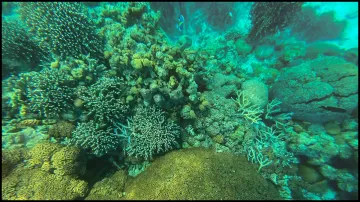Kochi: In a disturbing development, researchers have found that marine heatwaves are causing widespread bleaching of coral reefs in the Lakshadweep Sea, causing them to lose their colours due to stress, according to a study by the ICAR-Central Marine Fisheries Research Institute (CMFRI). The survey results have revealed that a considerable percentage of the coral species have undergone bleaching.
According to the study, the bleaching was primarily a result of prolonged marine heatwaves that have been affecting the region since late October last year. Marine heatwaves are rare extreme weather events that involve prolonged periods of abnormally high ocean temperatures, the CMFRI said in a statement.
According to the National Oceanic and Atmospheric Administration (NOAA), this level of Degree Heating Week (DHW) poses a substantial risk of coral bleaching, threatening the region's diverse marine ecosystems. These temperatures often exceed the 90th percentile of typical regional ocean temperatures based on historical data, said researchers.
What are coral reefs?
Coral reefs are one of the largest organisms in the ecosystem and are sessile animals - which means they permanently attach themselves to the ocean floor. According to NOAA, stony corals make up the largest order of anthozoans, and are the group primarily responsible for laying the foundations of, and building up, reef structures.
Corals only have a limited degree of organ development. They share two basic structural features - a gastrovascular cavity that opens up on one end for food consumption and waste expulsion, and a circle of tentacles surrounding the 'mouth', which help in capture and ingestion of plankton for food, clearing away debris from the mouth and serve as primary means of defence.
When the water becomes too warm, the corals expel the algae living in their tissues, which causes de-colouration and causes them to turn completely white. This process is known as 'coral bleaching'. Although corals can survive a bleaching event, they are under more stress and are subject to mortality. A massive bleaching event caused the US to lose half its coral reefs in the Caribbean within a year in 2005.
"Such heat stress levels signify a severe threat to coral health, leading to extensive bleaching where corals lose the symbiotic algae (zooxanthellae), compromising their survival by depriving them of essential nutrients," said Dr K R Sreenath, Senior Scientist of CMFRI.
Why is this a concerning phenomenon?
Although the Lakshadweep Sea has seen coral bleaching events before, the scale of the current event can be described as unprecedented. Since October 27, 2023, the Lakshadweep Sea has been experiencing these conditions, with the DHW indicator, which measures accumulated heat stress, surging above 4 degrees Celsius-weeks.
According to Dr Sreenath, if the DHW continues to rise to 12 degrees Celsius, it could precipitate an unprecedented biodiversity crisis due to multispecies mortality. Dr Shelton Padua, senior scientist at CMFRI, identified the primary causes of these marine heatwaves as excessive heat atmospheric transfer coupled with shifts in ocean currents, leading to unusually high water temperatures.
Noting that the health of marine ecosystems is integral to the livelihoods of coastal communities, influencing tourism and fisheries sectors, Sreenath said that the ongoing marine heatwaves are likely to cause significant economic losses by disrupting their vital ecosystem services. The death and disintegration of coral reefs can also threaten coastal communities, leaving them vulnerable to sea level aggressions.
The ongoing heat waves also threaten other critical marine habitats, including seagrass meadows, the expert said, adding that similar to corals, seagrass meadows are experiencing detrimental impacts due to the heatwaves, such as impaired photosynthesis, reduced growth, and hindered reproductive functions. "The degradation of these ecosystems can lead to the collapse of local marine food webs, affecting a wide range of marine species, from fish communities to marine mammals like dugongs and dolphins," Sreenath added.
(with inputs from agencies)
ALSO READ | Budget 2024: Sitharaman mentions Lakshadweep, says huge investments planned to attract tourists
Latest India News
